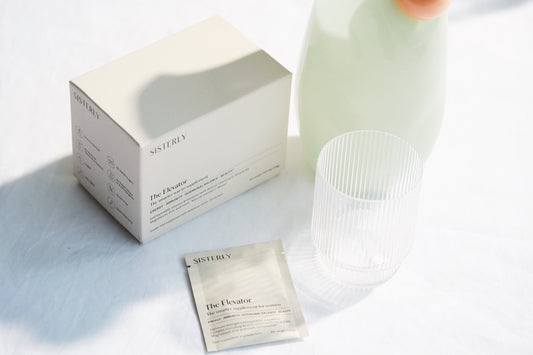WARNING: perimenopause and menopause are not laugh-a-minute topics but knowledge is everything and even if you’re one of the lucky ones to escape without significant symptoms, we all need to understand what our girlfriends and sisters are going through and why, so buckle up. Half the world’s population goes through this so it’s mind blowing how much of what our SISTERLY expert Susie Perry has to say will be news to you!
Susie Perry, Food Scientist and Nutritionist:
For most women, symptoms of the perimenopause start to creep in from the age of 45+. However, since many of the early symptoms can be easily attributed to the side effects of a busy lifestyle, stressful job, frequent long-haul travel, or the demands of parenting, it may take a few months or even years for you to actually realise that the root cause of your general lack of joie-de-vivre, is, in fact, your hormones.
How do you know you have hit the perimenopause?
The reason the perimenopause can be so confusing and hard to spot is that your perimenopause is completely unique to you. There are over 100 symptoms that you could experience and these are interchangeable, vary in severity, and in the beginning these symptoms may be infrequent, slightly bearable, and run alongside your normal menstrual cycle. So, it’s just business as usual, right?
Women are experts at juggling and excel at implementing coping strategies, so it’s no surprise to SISTERLY that many women just power through the early perimenopausal months when sporadic fatigue, headaches, mood swings, poor sleep, woeful mindset, poor alcohol tolerance, cravings, changes in skin and hair condition and a little bit of extra weight can all be justified for other factors that are playing out in your life.
If you are over 45, still have periods, and have been experiencing some of these symptoms either regularly or sporadically, then you could be in the initial stages of the perimenopause. Download the SISTERLY Perimenopause Symptom Checklist to decipher what your hormones are up to.
Progesterone and the perimenopause
The first hormone to stray from its usual menstrual cycle pattern is progesterone. Since progesterone is renowned for its relaxing and soothing qualities and oestrogen is known to stimulate the nervous system and increase the intensity of your emotions, this explains why the early perimenopause stage of low progesterone coupled with normal or elevated oestrogen enables headaches, tension, poor sleep, fatigue and edginess to set in.
Oestrogen and the perimenopause
Whereas progesterone tends to be more of a smooth and gentle decline the journey of oestrogen descent is much more turbulent and unpredictable. This is why you can feel fine for a period of time when oestrogen levels are relatively normal and then seemingly out of nowhere symptoms escalate quickly and you feel completely emotionally, physically and mentally all over the place, this relates to days when oestrogen levels randomly plummet.
Listen to your body
Eventually, your superwoman strategy may start to run out of steam, and your symptoms start to gain more attention and become more disruptive to your relationships and ability to keep on top of things. Hot flushes, night sweats, vaginal dryness, recurrent UTIs, unexplained exhaustion or days of debilitating fatigue, brain fog, poor memory recall, tearfulness, anxiety, panic attacks, migraines, feeling easily overwhelmed, not coping in challenging situations and extreme mood swings are all on the perimenopause menu.

Key nutrients for the menopause
The good news is there are a handful of key nutrients that help ease symptoms, especially handy if sleeping on a towel, holding the fridge door open for extended periods of time, or sticking your head out the window are becoming slightly impractical ways of dealing with hot flushes and night sweats.
The Elevator provides an excellent coverage of these key nutrients. Read on to discover how each nutrient cleverly supports the changes your body goes through during the menopause.
Magnesium and selenium
Interestingly, both magnesium and selenium may be deficient in menopausal women and are essential for the production and conversion of thyroid hormones, which play a crucial role in regulating metabolism. During perimenopause, thyroid function may become imbalanced, leading to symptoms such as fatigue, weight gain, and mood swings. Each sachet of The Elevator contains 150mcg magnesium (40% NRV) and 83mcg (150% NRV) selenium.
Chromium and cravings
In a time when middle-aged weight gain is at its most prominent the last thing you need is heightened cravings for sugar and alcohol. Prior to the menopause a healthy relationship between oestrogen and insulin means that blood sugar management is shipshape. During perimenopause, turbulent hormones create insulin resistance, dysfunctional blood sugar regulation and swooping blood sugar lows which trigger signals that upgrade biscuits, cakes, puddings, truffles and almond croissants to your highly desirable hit list!
Before you backpedal your way to a spin class or ponder the notation that you’ve experienced enough menopausal dryness to merit a glass of wine in the last week of sober October, just remember that chromium helps to re-establish insulin sensitivity, reinstating your ability to swerve cravings for alcohol and sweet treats and remain in the savoury lane. Thankfully, each daily sachet of The Elevator contains 40mcg (100% NRV) chromium.
Uplifting B vitamins
When tiredness and fatigue kick in, it’s B-vitamins that come to the rescue! B vitamins, including B6, B9 (folate), and B12, play important roles in neurotransmitter production, mood regulation, and energy metabolism. Menopausal women are prone to B-vitamin deficiency and often experience mood swings, anxiety, and fatigue, all of which may be related to hormonal changes and neurotransmitter imbalances. Each sachet of The Elevator contains a full spectrum of all the B’s you need including 5.5mg (500% NRV) B1, 7mg (500% NRV) B2, 25mg (156% NRV) B3, 24mg (400% NRV) B5, 7mg (500% NRV) B6, 15mcg (600% NRV) B12 and 400mcg (200% NRV) folate.
Beautiful biotin
When you start to notice changes in your hair, skin, and nails it’s time to call in the support of biotin. This menopausal beauty hero helps to preserve your natural glow. The Elevator contains 250mcg (500% NRV) of biotin.
Vitamin C and collagen
If you are wondering why your skin tone is changing it’s because women lose up to 30% of their collagen within the first five years of the menopause. Whereas biotin is an all-round beauty hero, it's vitamin C that does the heavy lifting for stimulating the production of new collagen and helping repair and preserve existing collagen.
The impact of this little nutrient is more than skin-deep since collagen is important for healthy bones, teeth, cartilage, ligaments, tendons, muscles and even blood vessels. And when it’s not busy adding strength and tone to your structural body, it’s also supporting your immune system. Your daily serving of The Elevator contains 640mg (800% NRV) vitamin C, as the gentle non-acidic form calcium ascorbate.

Hormone balancing zinc
Many symptoms of the perimenopause are underpinned by hormone fluctuations, if there’s one nutrient that oversees hormone balance it’s the mineral zinc. Lending zinc a helping hand in the role of hormone regulation are magnesium and vitamin B6. Zinc is also phenomenally important for the immune system so if lack of sleep, low mood, and fatigue have left you feeling under the weather and vulnerable to frequent infections, it’s zinc that your body needs. One daily sachet of The Elevator contains 5mg (50% NRV) zinc.
Calming magnesium
A staggering 60% of menopausal women experience insomnia or issues with sleep and perimenopausal women find it difficult to get to sleep and endure stints of early morning awakenings. Magnesium may help restore a better sleep-wake cycle by releasing tension from the mind and muscles, improving sleep quantity and quality.
Sleep deprivation is a gateway to mood disturbances, brain fog, difficulty concentrating, busy mind, worried mindset, irritability, and low mood - all recognisable symptoms of the perimenopause. One 2013 study revealed that out of 171 postmenopausal women, 81% had low magnesium. This mineral plays a role in mood regulation, cognitive function and helps modulate the stress response, all good reasons why The Elevator contains 150mg (40% NRV) magnesium.
Nourishing A and E
By now you’ll have figured that dryness is a bit of a thing in the menopause and it's not just ‘down there’ that’s the problem. Alongside vaginal dryness you could also experience sandpaper mouth, scratchy eyes and flaky skin, all linked to rock bottom oestrogen levels. Vitamin A and E have been studied for their role in maintaining healthy skin and mucous membranes and helping alleviate dryness. The Elevator contains 500mcg (63% NRV) vitamin A and 24mg (200% NRV) vitamin E.

Elevate your menopause
This hormonal phase of life should not be something that you are expected to just soldier on through. Getting your symptoms in check through good nutrition, positive lifestyle changes and the daily support of The Elevator, allows you to feel much more positive and embrace this new beginning.
References Menopause
Selenium
- Brough L, Gunn CA, Weber JL, Coad J, Jin Y, Thomson JS, Mauze M, Kruger MC. Iodine and Selenium Intakes of Postmenopausal Women in New Zealand. Nutrients. 2017 Mar 9;9(3):254. doi: 10.3390/nu9030254. PMID: 28282932; PMCID: PMC5372917.
Chromium
- Yan H, Yang W, Zhou F, Li X, Pan Q, Shen Z, Han G, Newell-Fugate A, Tian Y, Majeti R, Liu W, Xu Y, Wu C, Allred K, Allred C, Sun Y, Guo S. Estrogen Improves Insulin Sensitivity and Suppresses Gluconeogenesis via the Transcription Factor Foxo1. Diabetes. 2019 Feb;68(2):291-304. doi: 10.2337/db18-0638. Epub 2018 Nov 28. PMID: 30487265; PMCID: PMC6341301.
- Hua Y, Clark S, Ren J, Sreejayan N. Molecular mechanisms of chromium in alleviating insulin resistance. J Nutr Biochem. 2012 Apr;23(4):313-9. doi: 10.1016/j.jnutbio.2011.11.001. PMID: 22423897; PMCID: PMC3308119.
- Pei D, Hsieh CH, Hung YJ, Li JC, Lee CH, Kuo SW. The influence of chromium chloride-containing milk to glycemic control of patients with type 2 diabetes mellitus: a randomized, double-blind, placebo-controlled trial. Metabolism. 2006 Jul;55(7):923-7. doi: 10.1016/j.metabol.2006.02.021. PMID: 16784965.
- Anton SD, Morrison CD, Cefalu WT, Martin CK, Coulon S, Geiselman P, Han H, White CL, Williamson DA. Effects of chromium picolinate on food intake and satiety. Diabetes Technol Ther. 2008 Oct;10(5):405-12. doi: 10.1089/dia.2007.0292. PMID: 18715218; PMCID: PMC2753428.
B-Vitamins
- Porter K, Hoey L, Hughes CF, Ward M, McNulty H. Causes, Consequences and Public Health Implications of Low B-Vitamin Status in Ageing. Nutrients. 2016 Nov 16;8(11):725. doi: 10.3390/nu8110725. PMID: 27854316; PMCID: PMC5133110.
- Milart P, Woźniakowska E, Wrona W. Selected vitamins and quality of life in menopausal women. Prz Menopauzalny. 2018 Dec;17(4):175-179. doi: 10.5114/pm.2018.81742. Epub 2018 Dec 31. PMID: 30766465; PMCID: PMC6372850.
Biotin
- Patel DP, Swink SM, Castelo-Soccio L. A Review of the Use of Biotin for Hair Loss. Skin Appendage Disord. 2017 Aug;3(3):166-169. doi: 10.1159/000462981. Epub 2017 Apr 27. PMID: 28879195; PMCID: PMC5582478.
Magnesium
- Kolanu, B.R., Vadakedath, S., Boddula, V. and Kandi, V. (2020). Activities of Serum Magnesium and Thyroid Hormones in Pre-, Peri-, and Post-menopausal Women. Cureus, 12(1). doi:https://doi.org/10.7759/cureus.6554. PMID: 32042527; PMCID: PMC6996468.
- Baker FC, de Zambotti M, Colrain IM, Bei B. Sleep problems during the menopausal transition: prevalence, impact, and management challenges. Nat Sci Sleep. 2018 Feb 9;10:73-95. doi: 10.2147/NSS.S125807. PMID: 29445307; PMCID: PMC5810528.
- Jehan S, Masters-Isarilov A, Salifu I, Zizi F, Jean-Louis G, Pandi-Perumal SR, Gupta R, Brzezinski A, McFarlane SI. Sleep Disorders in Postmenopausal Women. J Sleep Disord Ther. 2015 Aug;4(5):212. Epub 2015 Aug 25. PMID: 26512337; PMCID: PMC4621258.
- Cao Y, Zhen S, Taylor AW, Appleton S, Atlantis E, Shi Z. Magnesium Intake and Sleep Disorder Symptoms: Findings from the Jiangsu Nutrition Study of Chinese Adults at Five-Year Follow-Up. Nutrients. 2018 Sep 21;10(10):1354. doi: 10.3390/nu10101354. PMID: 30248967; PMCID: PMC6212970.
- Stanisławska M, Szkup-Jabłońska M, Jurczak A, Wieder-Huszla S, Samochowiec A, Jasiewicz A, Noceń I, Augustyniuk K, Brodowska A, Karakiewicz B, Chlubek D, Grochans E. The severity of depressive symptoms vs. serum Mg and Zn levels in postmenopausal women. Biol Trace Elem Res. 2014 Jan;157(1):30-5. doi: 10.1007/s12011-013-9866-6. Epub 2013 Nov 24. PMID: 24271492; PMCID: PMC3895221.




